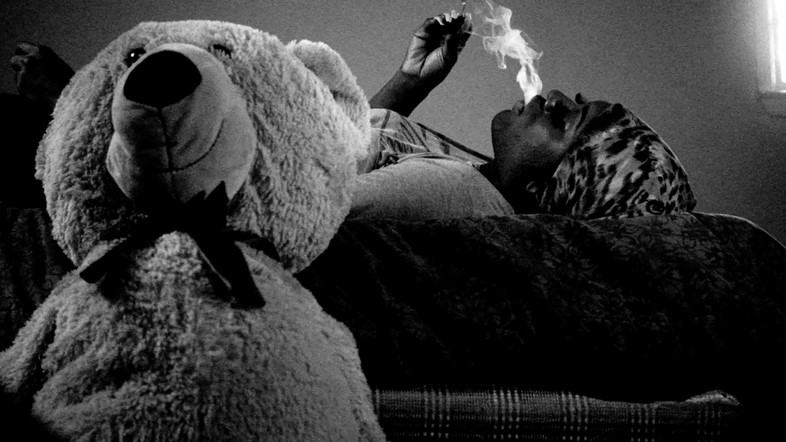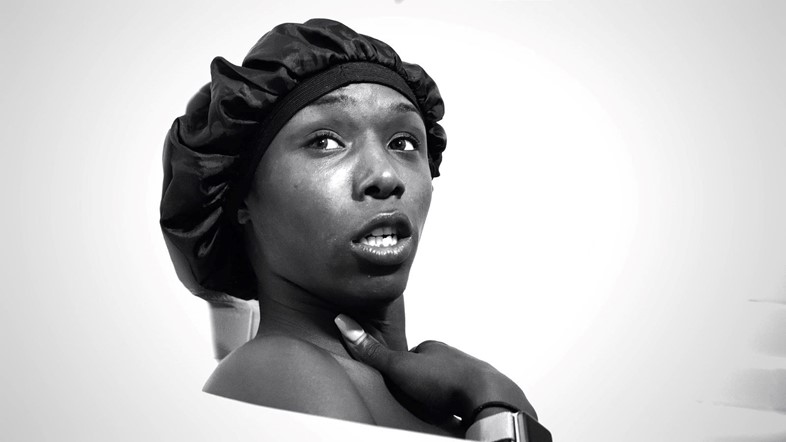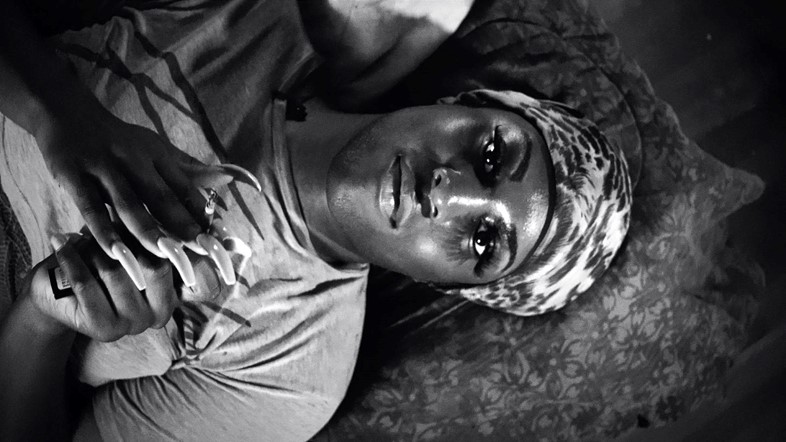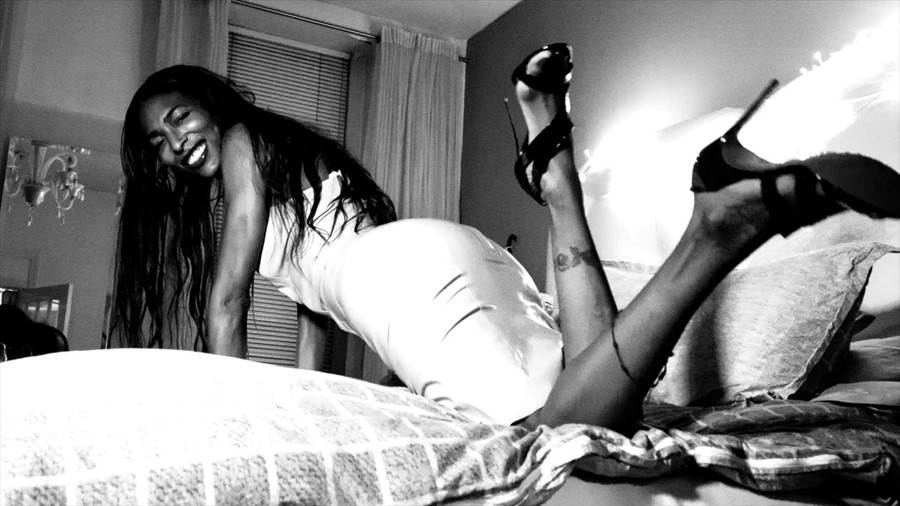Inspired by her own transition, D Smith’s Kokomo City is a probing portrait of four Black trans women and sex workers in New York and Georgia. Here, she talks about why trans women are “extremely special”
Braiding together the conversations of four Black trans women and sex workers in New York and Georgia, Kokomo City couldn’t be further away from the talking head documentary’s connotations of staid immobility. Edited with the energetic rhythm of a music video, it is whip-smart and unceasingly charismatic – as much a welcoming girls’ bedroom chat as it is a razor-sharp work of political theory. To listen to these women speak is a profoundly life-affirming experience.
The feature debut of Grammy-award-winning music producer D Smith, Kokomo City was birthed from hostility. When Smith went public with her transition, her music career ground to a halt. “It had never happened before: a producer in the industry that works with André 3000 or Lil Wayne comes out as transgender. And I just don’t think people knew how to handle it,” Smith says. “I thought I was invincible, and I took that for granted.”
Adrift and surfing friends’ couches, Smith wanted to tell the stories of other Black trans women. “I could only imagine what [it was like for] trans women that never had opportunities like I’ve had, how unsafe do they feel?” the director says. Something else she felt compelled to excavate: “That dichotomy between Black people and trans women. I wanted a conversation among Black people, as Black people. I want this shit to feel new, and urgent, and just dope,” she says.
Below, we spoke to D Smith about her electrifying film and the four incredible women it stars.
Xuanlin Tham: Liyah, Koko, Dominique and Daniella are so charismatic. I wanted to ask about Daniella – sometimes, I couldn’t even breathe while listening to her. She’s essentially a philosopher.
D Smith: No, she totally is!
XT: The way she dissects race, class, womanhood and masculinity, it’s incredible. What conversations led to those moments where she embarks on those monologues?
DS: Daniella had a lot to bring to the table: a lot of things that happened to her, a lot of things taken from her. She had a slight defensive thing about her. Not in an off-putting way – I was drawn to it, actually. But I wanted to tell her: that energy, let’s make it more purposeful. How do we reach outside of the four walls [of the LGBTQ+ community] and really grab people’s attention? Daniella is an absolute star. She’s a genius. She really tapped into those moments, and she went for it.
I wanted [the girls] to understand, without feeling they were being censored, that there’s a science to reaching people. We have to be less defensive and more open. I think they all knew this was gonna be different and we needed to tap into a fresher way to talk to our people.

XT: What do you hope Kokomo City illuminates about sex work and the way we talk about it?
DS: When you think of sex work, you think of being objectified. It’s like a bottle of water: you just use it and throw it away. And my God, trans sex workers – literally the bottom of the barrel to the world. But I was able to show how much that couldn’t be further from the truth. Trans women, we’re the top of the list. Trans women are extremely special, delicate and sensitive, but we’re in defense mode all day because we are trying to protect ourselves.
There were a lot of moments that were jaw-dropping for me when I was listening to them. I honestly went in with preconceived notions of who they were. But it shows how wrong I was to assume that a lot of these girls are doing [sex work] because maybe they don’t wanna work at Walmart.
“We have boyfriends and husbands. Why exclude them? This is not just an LGBT story. This is a Black story, about Black people. It was very important that everyone is represented to talk about their perspective on trans women” – D Smith
It’s very difficult for trans women to mesh into the real world. When trans women are first transitioning, we look ‘clocky’; we don’t look as feminine. A lot of people don’t want to see that in their businesses: they don’t wanna see a trans woman trying to get it together, a trans man trying to get it together, between surgeries, between hormone replacement. It’s a very vulnerable space for trans people to be in.
These women are notified that this is the easiest way to avoid all of that trauma: do sex work. It’s not the easiest job, but girl, you get your coin, you get paid, this is the way to go. For a lot of them, it truly was, because they were thrown out as kids. Daniella was in the streets at 15 years old. Why would a 15-year-old be in the streets of New York? Koko [was] 16. Why? If your family is throwing you out and not protecting you, the only choice you have is the street.
XT: I thought it was fascinating to approach men as secondary interview subjects. What was the importance of including their perspectives?
DS: We have boyfriends and husbands. Why exclude them? This is not just an LGBT story. This is a Black story, about Black people. It was very important that everyone is represented to talk about their perspective on trans women. Showing support was so rare. To see Black men in this film that are not being shamed on the internet, or getting caught running out of a motel room – this was actually very dignifying, very controlled.

XT: There are these gorgeous, lyrical interjections where we have Dominique in bed glamorously smoking a cigarette, or Liyah, towards the end of the film, with her arms outstretched at the park. What was the importance of this imagery?
DS: It was very important for me to create images that say, “Wow, she’s just not interviewing. She actually has a POV as a director.” So I asked Dominique, “Let me go through your closet. Let me see a sexy dress that you have.” She pulled out that dress. It was latex, so sexy, so provocative, but the silhouette was very classic. I was like, this is it. Let’s do a cigarette thing. It just felt so iconic!
She’s so gorgeous, she’s so sickening. I just fucking love her. She’s a quintessential New York girl, you know, she just happens to be transgender. I wanna show that glamorous side. I’m not glamourising sex work, I’m glamourising the woman. I shot from a worm's-eye view, just to make them bigger. The silhouette, Liyah with her hands up – I said, “What would you do if you felt free?” And she just moved. She was taking deep breaths and owning that moment. To be able to capture that was super gratifying.
“I’m not glamourising sex work, I’m glamourising the woman” – D Smith
XT: What, to you, is the most powerful moment in the film?
DS: This is probably the most intense moment of doing this film. Not to put her on the spot, but [Dominique] didn’t know me. We talked on the phone and I told her, “When I film you, would you be open to doing the end shot? Would you be interested in doing a full frontal?” She got really closed up and defensive. I think she lost a lot of faith in the process. She thought, “Oh, here we go, now it’s sexual.” And I had to explain to her, no – I want a full frontal, but I want to make it as [non-]sexual as possible.
She’s done porn. She’s almost a celebrity. Men absolutely love her. She has a very successful porn history. I don’t think she does it anymore but she did it for a while. I asked her, “I want something very powerful and iconic. I want you to stand in your absolute transgenderism, full confidence and safety, knowing that you’re being shot by a trans woman in your home. It’s just us. There’s no lighting person, there’s nothing. You don’t have to do it. But the fact that you’re giving me pushback is even more reason why. You have so many porn videos online, and you look really confident, but you’re afraid to absolutely be yourself without all of the lights, or a man, or a camera.”
We have to own our transgenderism no matter what we look like, or what procedures we have done. We are transgender from head to toe, and that’s something to be proud of. And the fact that she did it shows me – not how brave, I hate that word – but how important she is. And I’m glad I didn’t let her down. Just to make it less sexual, I said, “Hey, let’s burn some sage.” And how fucking beautiful was that shot? All that was needed was for her to trust me and be open. She was so badass for that.

XT: It’s one of the most powerful closing shots I can remember. I have to ask about Koko, who was tragically lost to gun violence this year. How has your relationship to the film – and how it captures Koko so lovingly – changed for you, in light of losing her?
DS: That tragedy was one of the hardest things in my entire life to process. She was such an amazing person. I hate when people die and that’s what all people say. But she truly was sent from heaven. She was an angel, and she was sent here to be in this film. And I feel that God’s taken her back when she left her message here. Her message wasn’t about transgenderism. It was, “I’m a beautiful person as a human being, and this happened to me.”
The other part we should talk about is this young man that killed her; he’s in jail now, and his future is completely dismantled. All of this happens because people are not comfortable with who other people are, and who they are. As beautiful as this film is, there’s a lot for us as Black people and as humans to learn. I hope we continue to tell amazing stories and somehow find a way to heal my people. Her life, her legacy will not be in vain.
Kokomo City is out in UK cinemas now.
